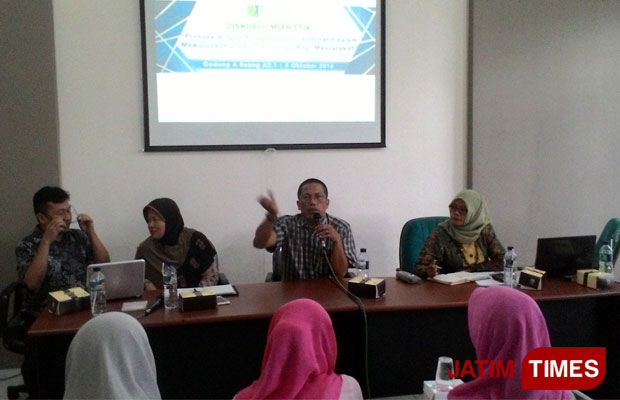
MALANGTIMES – The ever increasing fuel needs of the community has led various elements of the society to pursue for an alternative energy. Biogas is one of them.
The problem is, to cultivate biogas as an alternative energy within the community has encountered various challenges in terms of cultural and myths aspects living within the community itself.
These issues were presented during a scientific discussion entitled Biogas Prospect as an Alternative Energy to Bring Green Technology in the Middle of the Community, Wednesday (10/5) at Building A, Room A2.1 of the Raden Fatah Islamic University (Unira).
“Biogas as an alternative energy is a part of the solution in overcoming fuel supply issues within the community. In addition to the abundant supply of biogas materials within the community, materials such as human and animal excrements, domestic waste is also ecologically friendly,” Wasis Sasmito of Hivos-Yayasan Rumah Energi BIRU Consortium explained to the participants consisting of Unira’s students and instructors.
Wasis also stated that in terms of technical aspects, namely the construction of biogas installation, there are no objections from the community. “We as the representatives of YRE, in terms of BIRU activities, are ready to accompany the community whenever they are technically and culturally ready. As the greatest problem in cultivating biogas as alternative energy comes from the cultural and mythical aspects within the community,” he said.
Wasis provided an example on the strong culture which leads to the myths within the community. The challenges by the community, for example, are due to the the perceived filthy origin of the biogas materials which will be converted into a fuel, namely human and animal excrements.
“Hence, the perception is that using biogas to cook will ruin the flavor and smell like excrements,” she then burst into laughter. In reality the excrements have undergone fermentation process and converted into an odorless gas.
The culturally-influenced conditions have driven the community to put the biogas made of both human and animal excrements in a low priority.
“Occasionally the government put this campaign simply as a programme. It is not positioned as a necessity which must be continuously implemented and intensified within the community when an energy crisis is looming,” Wasis disclosed.
Other than cultural and mythical issues which remain widespread within the community, the technical impression in biogas reactor construction often time becomes an issue.
“Survey unavailability, both in terms of adequate and guaranteed supply of excrements in a particular location and underestimating the knowledge aspect in biogas reactor construction often are the case,” uttered Wasis. It is in fact requires a minimum of an eight day mandatory training to understand the knowledge.
“It is common practice with our government, to deliver a two-day training, and then rushing to construct a biogas digester in the village. I would say it is nonsense if it will work at all,” he affirmed.
There are plenty of factors that any individual, who intends to construct this biogas reactor, has to master. These understanding include such factors both biotic and abiotic
“Additionally it is necessary to understand about the balance between non-methanogenic and methanogenic phases. Temperatures, solid concentration, volatile acid concentration, scum formation, scum concentration, essential nutrient concentration, toxic substances and pH,” Wasis exposed. (*)
(Source: http://www.malangtimes.com/baca/14740/20161005/195107/kultur-dan-mitos-penyebab-gerakan-biogas-terhambat/)


